From a newsgroup
post, I particularly liked this reply by Hans-Bernhard Broeker: >
Luckily, it was the only bug introduced this way.
... the only one you've *found* so far. Absence of evidence is not
evidence of absence.
Despite having a lot to write about, the current state in Israel doesn't lend
very well to my writing habit. I need to be in a specific mood to write
properly, and my mood this past week could hardly have been further away.
I'm still up north; Monfort is
situated in Kibbutz Sa'ar, just north of
Nahariya. It means that when I'm at work I can hear everything - the Israeli
artillery attacks, the choppers and planes constantly flying to and from
Lebanon, and the Hezbollah-fired Katyusha rockets crashing down on most
Israeli cities and settlements up north. When I go home, be it to my parents in
Qiryat Haim or my own apartment in Haifa, the rockets follow. There are
air-raid sirens every few hours, and explosions to complement the waiting.
Ironically it's not the rockets that really scare me; the air-raid sirens are
the ones that really give me a fright, a throwback to yet another conflict that had
absolutely nothing to do with us. Even wrose, there is nothing quite as jarring
as walking the streets of Nahariya or Haifa; the usually busy streets and packed
shops are shut down, closed, devoid of life. I make it a point to support
whatever businesses that choose to remain open despite the situation (such as my
own company). There is solidarity, and there is also exasperation.
Lebanon has no claim in Israel. There is no Israeli-Lebanese dispute. Two
nations which could under other circumstances live happily in
peace are now actively busy with survival because a bunch of
freaking lunatics claiming to act under the volition of a nonexistant deity
decided the time was ripe to kill. So here you are, assholes: the killing has
begun, on both sides. I hope you're fucking happy.
Seeing as I had quite a few hours to spend in Beijing and no agenda
what-so-ever, I figured I'd just go with a guided tour. While a good idea in
concept this proved to be impractical because the guided tours provided by the
hotel require a reservation at least one day in advance. I suppose I could try
and look up a different guided tour, but as hardly anyone speaks English in
Beijing it didn't seem worth the time.
I took my luggage on me and started walking around Jianguomen district;
although the area directly near the hotel is strictly geared to tourists it was
still a fascinating walk. For starters, DVD shops are rampant (I saw at least 7
different stores in a two-street block) - I wouldn't be half-surprised to find
out that these were mostly pirated/fake DVDs, particularly considering the kind
of people who were attempting to lure me inside. In fact, just about everywhere
salespeople were practically dragging me inside their stores to look at their
merchandise; I suppose it's a good thing that I'm about 10cm taller
than the average Chinese, and an annoyed look was usually enough to make them
back off. It wasn't nearly as easy with the beggars and street urchins though,
firstly because they're much more persistent and second because it's a lot
harder to ignore a child and/or give him/her an angry look. The day
before one of my Japanese associates made the mistake of giving a kid some
change, and we were busy fending off other kids for the rest of the way.
 Tiananmen East
Station (source) Tiananmen East
Station (source) Just walking about Jianguomen got old after a couple of hours, and I was
looking for something more intelligent to do, at which point I decided to do
some sightseeing. Tiananmen Square seemed like the right place to visit, and
since I was already in tourist mode I figured I'd take the subway instead of a
taxi. This turned out to have been a very good idea for two reasons: first, the
Beijing subway is quite efficient, with two stations directly on either side of
Tiananmen Square (not to mention saving quite a bit of time and money on the cab
ride); second, it provided a fantastic opportunity to witness Chinese culture
firsthand. I was the only European anywhere in sight on the subway both on the
way there and the way back and the train was packed. At one point I was
standing near one of the doors and a women came in - the Chinese are an
amazingly small people, this particular woman was probably around 1.45m tall -
and almost ran into me. She looked up and, to my utter amusement, gave an
incredibly fearful look and practically ran away to the other side of the
subway car.
This would be a good opportunity to mention that the Chinese women are
absolutely beautiful. Besides the fact that they are an apparently slim
people (I saw ridiculously few obese, or even mildly fat, people during my time
there), the percentage of good looking women in China is amazingly high, as is
just how beautiful they are. Going back to Israel was something of a
downer in this respect...
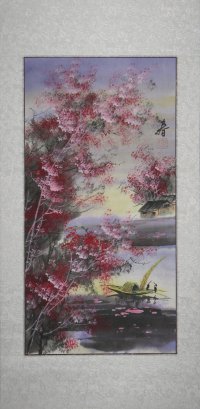
Beautiful drawing on rice
paper
Anyway, 3 Yuen and about 10 minutes later I was standing at the outskirts of
Tiananmen Square. I walked the perimeter to get a good look around (and was
surprised at how serious the looks on the honour guard's faces were). The National Museum of China is
located directly in front of the square; I realized this when a woman (who
spoke very good English) addressed me and tried to get me to go to an art
exhibition just above the museum entrance where "some of her work is shown."
Regardless of my artistic inclinations - or, more to the point, lack thereof - I
was completely put off by her tendency to shower me with ridiculous compliments
to get my attention. I do not appreciate a compliment from someone who doesn't
know me at all and has an agenda. I did, however, consider going into the museum
when a young art student who also spoke very good English approached me. Where
the previous woman failed due to dishonest praise, this kid won my attention
with sheer enthusiasm and happy disposition. I followed him to the art gallery
(which, as he promised, was air conditioned - a very good thing when you're
walking around with 15kg of luggage and it's 35 degrees centigrade!) and spent
the next hour looking at various drawings while the art student explained the
various techniques. His own work was (to my untrained eye) techincally
impressive but didn't really inspire me; a series of four drawings on rice paper
depicting the four seasons really impressed me, though. The drawings had
several details in common (house, boat and birds) but were completely different
in spirit. For a short while there I actually considered buying all four, as
they were so engaging, but the cost was prohibitive (starting price of 400 Yuen
- over $50 - per painting). I eventually bought the drawing for autumn (picture
on the left) for my mom and after a bit of haggling got the price down to 250
Yuen. I was probably ripped off, but my negotiation skills are still rather
lacking and, frankly, the kid was really doing his best and deserved his
commission.
After leaving the art gallery I strolled around Tiananmen Square for almost
an hour. It is huge, packed with tourists and duly impressive irrespective of
its history. I didn't have the time to go the Forbidden
City (according to people I spoke with, this alone can take an entire day)
and didn't have any other reasonable plans, so I eventually took the subway back
to Yonganli station (near the hotel) and headed to a local massage parlor for
another hour of rest and relaxation. Although not nearly up to the standards of
the hotel masseur (and significantly cheaper at that) it was still very
pleasant. After a shower and a rest I still had almost five hours before I
was to leave for the airport. Deciding to avoid exerting myself again - spending
10 hours on a plane in a drenched shirt is not my idea of fun - I searched
for a local internet café. A local Starbucks was supposed to have wireless
internet access, but apparently didn't - no-one could tell me why; I settled on
a small ice-cream parlor which had wired access and spent almost an hour
there.
I was trying to decide what to do next when my brother reminded me he's
looking for a new pair of headphones. I googled a bit and three minutes
later had a couple of speciality shops to visit. The sites were completely
in Chinese, so I asked the owner of the establishment I was sitting in to copy
down the address of one
of the stores (whose name I can't even pronounce) onto a note. Not only
was he willing to do this, but he called the store directly to make sure that
they'll still be open by the time I got there; I've come to the conclusion that
the Chinese people are amazingly curteous and helpful if you can get over the
language barrier. The shopowner explained that the shop is located about 20km
away so I decided to take a cab; it was a smart move in that I would have gotten
completely lost had it not been for the taxi, and a less-than-smart move in that
it turned out to be a fairly expensive (in Chinese terms) 45 minute ride. I had
no idea what to expect when I got there, and was completely dumbfounded to find
that I've just entered a huge mall (almost as large as the biggest
general-purpose mall in Israel) completely dedicated to electronics! It would've
been heaven had it not been for the fact that I arrived just minutes before
closing time. The shop numbering scheme didn't make a whole lot of sense and I
was getting extremely anxious, thinking that when I find the shop it'll be past
closing time. I also got a lot of curious stares from the completely Chinese
shopkeepers and customers, apparently not used to having a European guy moving
purposefully about their mall with a large bag...
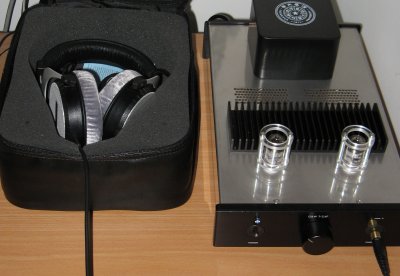
New hi-end
toys
When I finally found the shop, its owners were apparently just preparing to
close down. After all the effort it took to get there I wasn't about to let them
close down before I've had my fill; I asked (using mostly sign language, as the
shopowner didn't know a word of English, nor did any member of her family -
which were all present by the way) to hear the Beyerdynamic
DT880 headphones. I've been reading about these cans for a while and they've
been said to compare favorably to my aging Sennheiser
HD600; it seemed to be a good time to replace the latter, and I was
interested in what Beyerdynamic had to offer. I'll leave the detailed review for
a later post, but suffice to say I was extremely impressed with these cans. I
then requested to listen to headphone amplifiers; I spent about five minutes
each with amps from G&W Tsinghua
University (a Chinese manufacturer of hi-end audio equipment which was
previously unknown to me), including AT-F100 and
the (apparently very popular) TW-J1.
Neither one really struck a chord with me, so I gestured to the shopowner that
I'm interested in other equipment; she then pulled a brand new box from a
storage cabinet and took out a T-2.6F
headphone amplifier from the same manufacturer. I was so utterly blown away
that I took out my credit card on the spot and bought two pairs of DT880 and the
T-2.6F: about $260 for each can - not cheap compared to the US, but
about 30% lower than the price in Israel - and an additional $350 or so for the
amp.
When I was done with the shop I took a cab back to the airport, which took
over an hour but still cost only 100 Yuen ($14 or so) including the 10 Yuen
for the expressway toll. The cabby apparently didn't know precisely where to go
because although he did get me to the airport, he dropped me off quite far away
from the terminal entrance; this was especially annoying with all the luggage I
was carrying (a couple of plastic bags, my laptop, the large side bag and now
also the relatively heavy headphone amp in a cardboard box). I made it through
customs and check-in to find one of the smallest but best-kept lounges I've yet
been to; it was very clean, very quiet and very comfortable. I spent a couple of
hours there before the flight back and had a very pleasant time (despite a
spotty wireless internet connection) before it was time to get on the flight to
Istanbul. The flight back was almost exactly the same as the flight to Beijing,
so if you're interested in the details you can check out the previous
post.
I'm currently on El-Al flight LY075 to Hong Kong. Imagine my surprise when I
turned on the laptop and found an active wireless network; then ponder upon just
how baffled I was to find that it points to the Boeing Connexion log-in site.
Finally, imagine my utter astonishment when the internet connection proved to be
working, reliable and even quite fast!
Intercontinental flights will never be the same again.
I'll pick up where I left off: Beijing
International Airport. I'm getting the feeling that all airports are
alike, psuedo-European and industrial; on the inside, Beijing International
Airport is exactly the same as Ben-Gurion or Atatürk, the only difference being
the faces that scrutinize you over the counter. I must admit that given China's
image in western journalism I've felt somewhat apprehensive at this
point, but the officials there are as efficient and courteous (if not more so)
than any other government agency I've ever dealt with. Oddly enough I was
required to fill in customs and health statements before I was allowed in the
country. I never could figure it out: why would anyone bother asking you a
question such as "do you carry a horrific, easily contractible disease?" -
presumably if I were I wouldn't be travelling in the first place, and if I
were travelling with a contagion for some
clandestine reason I certainly wouldn't tell anyone about it. I had a
vague and apparently misplaced belief that a non-democratic government would be
less prone to pointless bureaucracy. Ever the optimist. The difference between China and, well, everywhere else I've been to up
until that point, became pronounced the minute I stepped out of the airport
gate. There are a lot of people in China. As obvious as that may be
when looking at the numbers (approximately 1.3 billion according to the CIA
factbook), it only really becomes evident when you actually walk the streets
of Beijing. Israel is a very small country, both in size and in population (6.2
million, same source) and the difference is staggering. I was so overwhelmed at
the sheer volume of people moving about that, after getting out of their way, I
had to simply sit down and shake it off. The previous picture hardly does
it justice. I then took a shuttle to Jianguomen, which I was told was near the hotel I
was to stay in. This proved to be both a fascinating experience and a really bad
idea: fascinating because I got to experience a little slice of Beijing
immediately after landing, and because it forced me to learn new ways to
communicate. The average resident of Beijing (including bus and taxi drivers)
does not speak a word of English. This is also why taking a shuttle bus was a
very bad idea. Aside from it being very small (unlike myself and my luggage) and
without any air conditioning (it was 35°C outside!), it also dropped me in what
I then thought was the middle of nowhere, with no map and hardly any way of
asking for directions. I walked around a bit but was soon exhausted, what with
the heat, the lingering tiredness from the flight and the bloody luggage; I
eventually stopped a taxi and had it drop me off at the hotel, which turned out
to be about 10 minutes' walk away from where the shuttle dropped me off. This
would be a good time to mention that taxis in Beijing are quite cheap; a short
ride costs 10 RMB (about $1.25 US), and even an hour-long trip to the
airport cost 100 RMB including toll. That is amazingly cheap compared to Israel
-- I'm wondering if this has anything to do with the Chinese government
subsidizing the prices in preperation for the 2008 olympics.
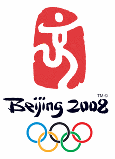 Speaking of the olympics, I'm still awed by the sheer scale of the
modifications, reconstruction and improvement efforts in Beijing. The Chinese
government evidently takes the olympic games very seriously from a public
relations standpoint, and is sparing no expense in preparation. I imagine that
if the 2008 olympics were to take place in Israel, the same efforts on a much
smaller scale would probably begin a few months before the games.
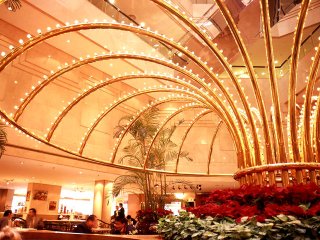 Jianguo Hotel
lobby Jianguo Hotel
lobbyMy next stop was the Jianguo Hotel
Beijing. Located two seconds from the Yonganli subway station and ten
minutes (by subway) from Tiananmen Square, the hotel is pretty much a standard
5-star European hotel, with the exception of a magnificent artificial
river-garden running smack in the middle of it. Although not bad by any means, I
was somewhat disappointed at how artificially European the hotel is; everything
from the large, golden lobby, the wooden architecture in the guest rooms, the
oversized dining room with its inevitably ridiculous decor ("old
masters"-inspired paintings and even a full-size harp in the corner!) and
finally the diner which serves American-style food (to which I'm not partial
even at the best of times). I mean, this is China! Where is the Chinese
decor?
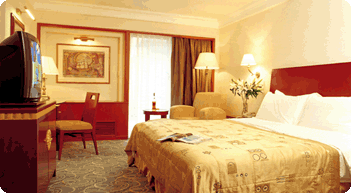 Jianguo Hotel guest
room Jianguo Hotel guest
roomAnyway, having found myself fully checked into the hotel and post-shower by
16:00 (local time) I had several hours to burn until the business
associates I was to rendezvous with were slated to arrive. I spent a couple
of hours doing some work and also finishing up the first post on the trip; this
still left me with about three hours before said associates arrive. I sent the
suit to be professionally ironed (I can certainly use an iron, but not nearly as
well as a professional) and then elected to happily spend the next two hours
getting an oil massage. Having read some books that discuss Chinese culture
- albeit from a fiction standpoint - I should've realized Chinese
pragmatism extends to sex just as it does to business, but I was
ill-prepared for the barrage of overt questions and propositions. It appears
that the Chinese business culture comprises chiefly of two principles: you'd
better haggle and everything is for sale. European puritanism
aside, I wasn't interested and settled for a simple massage with no added
value; suffice to say that it was the best massage I've ever had, so
evidently there were no hard feelings on the hostess' part (Chinese
pragmatism in action?).
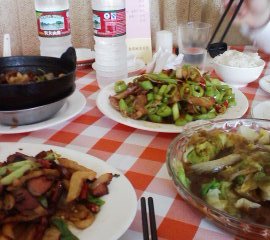 I spent the rest of the evening and the next morning's breakfast in pleasant
conversation with our business associates. The next morning we went to the
business meeting which was the original purpose of this trip; for obvious
reasons I won't go into details. We then proceeded to a restaurant situated very
close to where the meeting took place; I'd offer a name or address, except that
I can't read Chinese and absolutely none of the restaurant's staff could speak
English. Ironically this was never a hindrance - we made do with a combination
of sign language and the pictures in the menu. We were served several dishes
(pictured on the right); the dish nearest the rice bowl was quite possibly the
best dish I've ever had. It was a mixture of hot green and red peppers with
bacon (I think it was bacon. I couldn't really ask and would rather not
know) stir-fried in some sort of soy-based sauce; the combination was utterly
staggering, and I sincerely hope to find a dish worthy of this one at some point
in my life. The other dishes were also terrific: chicken in some sort of sweet
thick sauce, and a mix of vegetables with goose and bacon (the dish nearest the
camera). All of this along with rice and lots of juice meant that I was soon
completely satisfied, and then came the really pleasant surprise: although all
three of us were unable to tackle even half the food, the total cost of the meal
was less than 200 RMB (about $25). I've had meals that cost as much for
just myself in Israel, and were certainly not up to this quality!
It was time to bid farewell to my pleasant companions who had to catch an
early flight, and also about time to get out of the damned business suit (it was
stifling hot!) and find something to do for the next few hours (it was about
13:00 at this point, and I only had to be at the airport around 22:00...). I'll
blog about what I did during that time in the next (and final)
post.
OK, I concede the point: Notepad++ is awesome!
I configured Total Commander so it brings
up Notepad++ on edit, and it's ridiculously useful: you get syntax
colouring, line numbering, tabbed windows and more at the cost of a
slight increase in startup times (it's about 200ms slower than Notepad on
startup, and it's worth it). I feel really stupid for not having tried it
before.
Also, I've always shied away from application launchers, but have decided to
finally give Slickrun a try. So
far it's only mildly useful (I used to do the exact same thing with batch files)
but that might change. I'll post an update in a month or two.
As a sidenote, although the Natural Ergo 4000 is a terrific keyboard I've
decided that the IBM Model M is still the better of the two. I think I'll try
the black 104-key Customizer next,
except that you can't get those in Israel. Ideas?
Around 21:00, June 22nd 2006, Neve
Shalom.
Roger Waters appears on stage for the first time in Israel.
This is the biggest thing to happen here all year, and one of the most
important events in my life. I'm still finding it a little difficult to find the
right words... and as they say, a picture is a lot more economic, so:
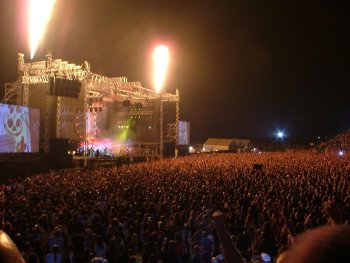
Image by Assaf Carmeli. Click
here for more
pictures
54,000 people singing in unison the lyrics for some of the best known rock
songs in history. It was a three-hour aureal orgasm.
I want to go back.
Remember Nuclear
War? If not, slap yourself on the wrist and go download it. Right
now, like.
One night a couple months ago (before my laptop hard drive
woes, which are nay over by the way) I found myself unable to sleep at 5 in
the morning. I figured a couple of rounds of Nuclear War would do well to
alleviate my sleeplessness; I fired the game up and after 10 minutes was hit by
a sudden inspiration. The game is turn-based, and the controls are exceedingly
simple: mouse cursor and left click. Since I was still looking for something
useful to do with my newly acquired PDA it struck me that the game would work
extremelly well on a stylus-equipped PDA or phone, and I was wondering if
someone made a version for Pocket PC devices. A quick search through Google
assured me that this is not the case, and since I had the next day off I fired
up Visual Studio and started working.
At that point I figured that a simple rewrite wouldn't do. I wanted an
identical version of the original game. Since New World Computing
is no more, I figured the chances of getting the source for a 1988 game are a
little on the slim side. At a whim, I fired up IDA Pro and started
working. A couple of days later I managed to disassemble most of the graphics
code and image decompression (LZ78-derivative)
and wrote a utility to help me extract the game assets. It features picture and
palette display, histogram and font parsing:
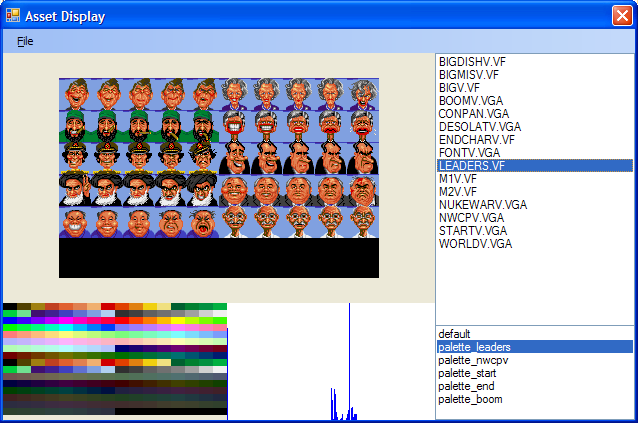 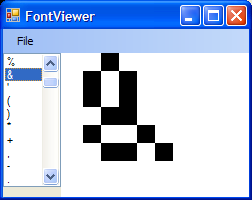
Interesting technical footnote: the palettes were embedded in the data
segment; I wrote a regex-based parser for IDA's assembler output for this
purpose. The palettes were in the VGA 0..63 scale, but some values are also
higher and have to be clamped, which gave me quite a bit of grief until I
noticed this.
With the game assets ripped I could proceed to write some actual code,
however this posed an interesting dilemma: I want the game to be completely
faithful to the original, but disassembling the game logic and AI is a huge
task. I originally estimated it would take a month to complete the reverse
engineering, but given that it's already been two or so months (discounting my
laptop's downtime) it seems my guesstimate was woefully inadequate. This is
where I turn to you for feedback: should I keep going in this direction (meaning
the alpha version will probably take another several months to be released), or
should I just write my own game logic and AI code, get a release out and then
proceed with reverse engineering?
Let me know your thoughts. Also, if you want to create better (higher
quality, different) graphics and music for the game get in touch -- I'm aiming
for a very spartan first release (to keep it in a reasonable timeframe), but
once I'm done with this baby the sky's the limit.
As I mentioned in my previous
post, my previous travel experience is somewhat limited. The one aspect of
this trip I had absolutely no way of preparing for was the hours I was about to
spend in airports and airborne. The travel arragements included a short (1.5
hours or so) flight to the TAV Atatürk International
Airport in Istanbul and a connection flight to Beijing Airport, both by Turkish Airlines. Unlike my previous trip
to Turkey, this time the flight was far longer (the connection flight to
Beijing takes 9-10 hours); also, in stark contract with the previous trip's
charter flight, this time I was to fly business class. Proper food? Legroom?
What a concept!
I arrived with my gear at Terminal 3 of the Ben-Gurion
Airport in Tel-Aviv. Proceeding to check my baggage in, I've encountered the
first of the many perks of business class: radically reduced lines to security
and check-in (all airlines have a dedicated desk, and the TA airport has a
special X-Ray line for business class passengers as well.) After checking in and
exchanging some currency (along with passport control and additional
security checks) I proceeded to the passenger hall and then did some shopping in
the duty free shops there. I still had a while before my flight, and it was then
that I made use of the second major perk in business class: the CIP lounge.
Turkish Airlines make use of a CIP lounge operated by Dan hotels and is an extremely
welcome respite from the bustling mess that is the passenger hall. Aside from
wireless internet access - which is actually available in the regular passenger
hall as well, but that isn't necessarily true for all airports - the CIP
lounge features comfortable seats, private bathrooms, a private meeting room
(for those who require it and will pay extra, of course) and refreshments. Most
importantly, it's uncrowded and quiet; having spent a total of over 10 hours in
airports in the span of three days I've learned to appreciate the relative peace
and quiet of the CIP lounge. I can't imagine what spending those hours would be
like in the regular passenger halls. The Dan CIP lounge in Ben Gurion airport
(section B) is fairly small compared to the lounges in Istabul and Beijing
(more on those later) but is perfectly equipped: comfy seats, sodas, light food
and some alcoholic beverages if that's your thing.
 Boeing 737
interior diagram (source) Boeing 737
interior diagram (source)
My next station was the Turkish Airlines Boeing
737-800 airplane headed to Istanbul. I've flown in a charter 737 flight
before, and even at 14 could vaguely recall the airplane as cramped and
uncomfortable; I was hopeful that the business class section would be radically
more comfortable, but alas that was not the case. The 737 is fairly small (39.47
metres in length and only 3.76 metres wide, internally [source])
and quite uncomfortable. The Turkish Airlines plane was configured so that the
business class seates were slightly further apart (for a little more legroom),
but each row still contained triple seats (as in the diagram) which do not
comfortably accomodate an above-average sized person. The middle seat
was converted into an armrest/cup holder though, so at least I had some freedom
of movement. Despite the short flight (less than two hours) the food was
actually excellent: the main dish was a halibut fillet with saffron rice,
shrimp and calamari. Being generally averse to fish, I was very much
surprised at how good the dish was.
The Atatürk airport in Istanbul was where I made my home for the next 4 hours
or so. I met a pleasant guy called Haim on the way and we had a beer at
the local cafe (at about three times the proper price); he's a real-estate
entrepreneur doing business in China and had some insights to share about the
culture there. After strolling about the duty free complex (which is over thrice
as large as the one in Tel-Aviv) for a bit I proceeded to the CIP lounge, which
is considerably larger than the one in TA. The lounge is decorated in Ottoman
style and is very appealing. Despite the large variety the refreshments are
fairly basic; wireless access was spotty and somewhat problematic and the
restrooms weren't nearly as highly maintained as in TA. The couches were rather
comfortable though, and I put them to very good use. Unfortunately I was
unable to find any pictures of the lounge on the 'net.
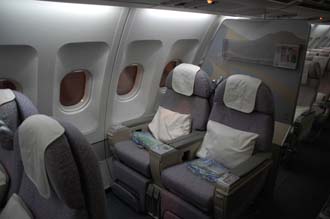 A330-220 business class seat
(source) A330-220 business class seat
(source)
The Airbus
A330-200 airplane which was my transporation from Istanbul to Beijing was an
extremely welcome change from the 737 which brought me to Istanbul. At a length
of 58.8 metres and a maximum internal width of 5.28 metres, the plane (and the
business class seats in particular) is spacious and comfortable. There is as
much legroom as you could possibly want, and the seats are wide enough to
accomodate large persons as well as small (although I could use a few
extra centimetres for my legs). The Emirates Airlines plane depicted on the left
is somewhat different from the one I took - the seats on the Turkish Airlines
airplane were somewhat larger and had an adjustable led-based lamp above of
the arm-rest. On the back of each seat (facing backwards, towards the passenger
in the next row) is an LCD screen which can be controled via a remote control
unit inside the arm rest (where it can be seamlessly stored for takeoff, landing
and taxi). A fairly large selection of movies was available on an individual
basis; since I had my laptop with me I didn't make any use of this feature,
but there were some pretty good flics (e.g. From Russia With Love) if one
was inclined to watch them. Also featured was an in-flight map, an external
camera (particularly cool during takeoff/landing) and some intercontinental
communication features I had absolutely no use for.
The service on this flight was absolutely top-notch: helpful, efficient (and
attractive!) stewardesses cater to the passengers' every whim. Other than
regular soft drinks, sodas etc., alcoholic beverages were served, and not
cheap-ass drinks either: several brands of wine (both Turkish and foreign),
Johnny Walker Black Label and even Glenfiddich Antique (18 years old). I was
fairly tired and opted for a glass of Graham's Port Late Bottled Vintage
(Portuguese sweetened red wine) which was terrific. Food was surprisingly not
quite on par with the previous flight, but at least we got to use proper cutlery
(Israeli security procedures do not allow metal cutlery on flights to/from
Israel).
Between all of this grandeur and sitting among all of those people in
business suits made me crave some balance; out came the laptop and headphones,
and two Buffy episodes later I was finally tired enough to fall asleep. I woke
up just in time for the pre-landing breakfast, and I'll tell you the rest in the
next post.
Next up: China, shopping and the way
back
My travel history is not a particularly interesting one: a trip to London
with my parents when I was 14, another trip to Turkey last year. Other than
that, nada. So it was with particular interest that I took on a business trip to
China: for starters, I was eager to get into the business side of things at
Monfort. Second, I am fascinated with
Chinese culture and have been planning a trip to China in ages. Lastly, it's a
paid business trip to another country... I'm being paid to do
things I would never have been able to afford on my own. Obviously, I said
yes!
Going on a business trip is quite different from going on a vacation and
has its own set of rules. I had to get a business suit, business cards and
similar crud. I'm not a big fan of clothes in general (Israel is extremely
hot and I'm very averse to heat) and uncomfortable, constrictive clothes in
particular, so it's no surprise that I have never worn a business suit. There is
a whole etiquette involved: colour matching, the type of jacket, button
placements etc. These are mostly trivialities, but it gets a little more
interesting with ties: the first and last time I ever wore a tie was for my Bar-Mitzvah party, and my dad put
the tie on for me. This time it wasn't really an option as I was going to
Beijing on my own. Luckily the 'net has once again proven to be an indispensible
information repository, and over a weekend I was able to successfully teach
myself how to tie a half-windsor knot from
scratch. (This might be a good time to note that, externally, I can't see any
difference between half-windsor, full-windsor or four-in-hand knots. They
all look alike to me.)
I'm usually inclined to do my homework before going into a new venture; in
this case it meant doing serious reading on business suit etiquette (as
mentioned above) and an overview of both Japanese and Chinese business culture
(since I'll be meeting both). At least in theory business cards are a major
aspect of oriental business culture - such cards are prerequisites for
businessmen from either culture, or those interested in doing business in the
orient. There are even customary rules on how to present business cards: either
one hand (always the right) or, preferably, with both hands, with the written
side facing the other party. Some sites go as far as to recommend double-sided
business cards, one side in English and the other in whichever language is
relevant to your uses. Finally, it makes an impression to hand out the
cards from a holder (pictured on the right). These are supposedly easy to come
by in any gift shop (which are abundant in Israel for some reason), however I
found this out a little too late and was unable to obtain one in time for my
outgoing flight. I figured I'll just pick one up at the airport, but apparently
none of the shops in either the Israeli or the Turkish duty free zones carry
such products.
A major difference between this trip and any other I've ever been on is
packing detail: packing the suit takes special attention. I'm a pretty
experienced hiker so packing is a trivial task for me; I usually pick the
smallest necessary bag and pack just what is necessary (or useful) for the
purpose of the trip. Although a suitable strategy for hikes through Israel or
trips to Turkey, this strategy proved inadequate because of the
suit: I used a folder for packing the suit shirt, and a special carrying
bag for the jacket and pants. I'm only going for a few days so I didn't pack a
large bag or suitcase and settled for a medium-sized carry-bag... which turns
out to have been a mistake. Although I carried very little on this trip, the
jacket bag wouldn't fit in under any circumstances (not without
twisting the jacket inside) and I had to carry it with me everywhere (duty free,
lounge, plane, etc.). I'm definitely picking a proper suitcase for the next
trip. The special shirt folder also proved inadequate and I had to have the
shirt ironed again.
I figured the few things I'll be needing before and during my flights can be
kept in the laptop bag. This includes a wallet, glasses and the various
documents (flight tickets, passport) I'll be needing on my trip. This would've
been a wise decision if it weren't for two factors: I needed some extra space
for the stuff I bought at the Israeli duty free zone (The Da Vinci
Code and a bottle of Rémy Martin XO
Excellence), and the damn suit carry bag kept bothering me. I think I'll go
with a small traveller's bag next time.
The one thing I didn't plan properly was a camera. I could've borrowed my
dad's camera (Minolta
Z2), but it's large and unwieldly. I wanted to buy a compact digital camera
and figured I could buy a mainstream camera for a reasonable price in the
Israeli duty free. This also turned out to be a mistake, because the price for
the camera I was initially interested in (Canon Digital IXUS 50)
was considerably higher than the price I could get even inside Israel. No luck
in the Turkish duty free zone either, so it's mostly a question of whether or
not I can find the time in China to look up a camera.
Next: the actual flights.
|